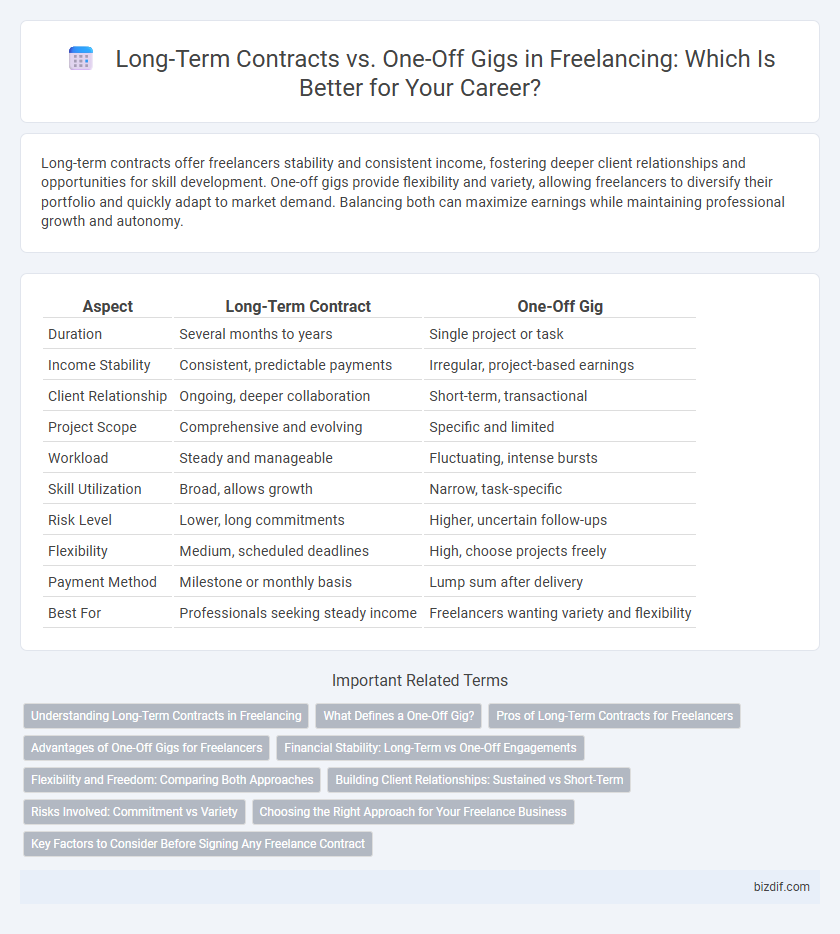Long-term contracts offer freelancers stability and consistent income, fostering deeper client relationships and opportunities for skill development. One-off gigs provide flexibility and variety, allowing freelancers to diversify their portfolio and quickly adapt to market demand. Balancing both can maximize earnings while maintaining professional growth and autonomy.
Table of Comparison
| Aspect | Long-Term Contract | One-Off Gig |
|---|---|---|
| Duration | Several months to years | Single project or task |
| Income Stability | Consistent, predictable payments | Irregular, project-based earnings |
| Client Relationship | Ongoing, deeper collaboration | Short-term, transactional |
| Project Scope | Comprehensive and evolving | Specific and limited |
| Workload | Steady and manageable | Fluctuating, intense bursts |
| Skill Utilization | Broad, allows growth | Narrow, task-specific |
| Risk Level | Lower, long commitments | Higher, uncertain follow-ups |
| Flexibility | Medium, scheduled deadlines | High, choose projects freely |
| Payment Method | Milestone or monthly basis | Lump sum after delivery |
| Best For | Professionals seeking steady income | Freelancers wanting variety and flexibility |
Understanding Long-Term Contracts in Freelancing
Long-term contracts in freelancing ensure a steady income stream by establishing ongoing work relationships with clients, often spanning several months to years. They provide stability and opportunities for deeper project involvement, skill development, and stronger client trust compared to one-off gigs, which are typically short-term and project-based. Understanding the terms, scope, and deliverables in long-term contracts is crucial for managing workload, expectations, and securing consistent freelance revenue.
What Defines a One-Off Gig?
A one-off gig in freelancing is defined by its short-term nature, specific scope, and singular deliverable, typically completed within a limited timeframe. Unlike long-term contracts, one-off gigs involve a single project or task without ongoing obligations or recurring work. This type of engagement allows freelancers to quickly diversify their portfolio and income sources by taking on varied, isolated assignments.
Pros of Long-Term Contracts for Freelancers
Long-term contracts provide freelancers with steady income and financial stability, reducing the uncertainty common in one-off gigs. These contracts enable stronger client relationships, leading to better collaboration and increased trust over time. Consistent work also allows freelancers to develop deeper expertise in specific industries or niches, enhancing their professional portfolio.
Advantages of One-Off Gigs for Freelancers
One-off gigs provide freelancers with flexibility to choose diverse projects, expanding their skills and portfolio across various industries. These short-term engagements reduce commitment risk, allowing quick adaptation to changing market demands and personal schedules. Higher hourly rates often compensate for the lack of long-term stability, maximizing income potential in condensed time frames.
Financial Stability: Long-Term vs One-Off Engagements
Long-term contracts provide consistent income streams, reducing financial uncertainty common in freelance work. One-off gigs offer flexibility but often lead to fluctuating earnings and gaps without pay. Prioritizing long-term engagements supports steady cash flow, essential for budgeting and financial planning in freelancing.
Flexibility and Freedom: Comparing Both Approaches
Long-term contracts provide consistent income and project stability, allowing freelancers to plan their schedules and financial goals effectively. One-off gigs offer greater flexibility and freedom to choose varied projects, enabling freelancers to diversify skills and maintain control over their workload. Balancing the predictability of long-term contracts with the adaptability of one-off gigs helps freelancers optimize both financial security and creative independence.
Building Client Relationships: Sustained vs Short-Term
Long-term contracts foster sustained client relationships by enabling freelancers to deeply understand client needs, deliver consistent quality, and adapt to evolving project requirements. One-off gigs offer quick, transactional interactions that limit opportunities for trust-building and repeat business. Prioritizing long-term contracts enhances professional reputation and secures steady income streams through ongoing collaboration.
Risks Involved: Commitment vs Variety
Long-term contracts in freelancing offer stability and consistent income but carry the risk of reduced flexibility and potential burnout due to extended commitment. One-off gigs provide variety and the chance to explore diverse projects, yet they pose income unpredictability and require continuous client acquisition. Balancing these risks is essential for sustaining a successful freelance career.
Choosing the Right Approach for Your Freelance Business
Long-term contracts provide stability and predictable income, allowing freelancers to build deeper client relationships and plan their workload efficiently. One-off gigs offer flexibility and variety, enabling freelancers to diversify their portfolio and explore different industries without commitment. Assessing your financial goals, project preferences, and risk tolerance helps determine the best approach for sustaining and growing your freelance business.
Key Factors to Consider Before Signing Any Freelance Contract
Assess stability, project scope, and payment structure before committing to a freelance contract, as long-term contracts offer consistent income and relationship building, while one-off gigs provide flexibility and varied experience. Evaluate client reputation, deliverables clarity, and termination clauses to mitigate risks and ensure mutual understanding. Prioritize contracts with clear terms on deadlines, revisions, and intellectual property rights to protect freelance work and maintain professional standards.
Long-Term Contract vs One-Off Gig Infographic

 bizdif.com
bizdif.com